At least 50 people were killed yesterday in one of the nation’s worst railway crashes, when a train partially derailed in Hualien County after colliding with a vehicle that had rolled down a hill.
Taroko Express No. 408, which left New Taipei City’s Shulin Railway Station and was expected to arrive at Hualien Railway Station at 9:39am, struck a crane truck at 9:28am as the train was about to enter the Cingshuei Tunnel (清水隧道) in Hualien’s Sioulin Township (秀林), said the Taiwan Railways Administration (TRA), which operates the train.
As of press time, 50 people, including the driver and assistant driver, were confirmed dead and 146 injured.
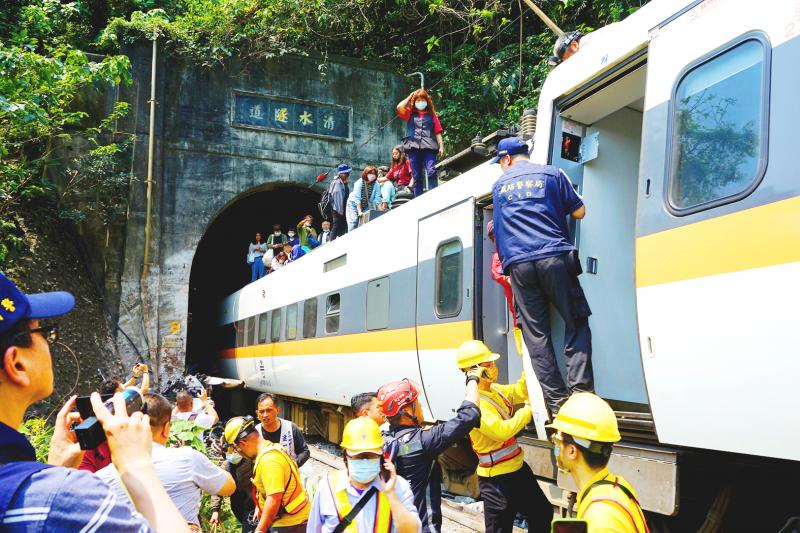
Photo: CNA
One French national was among those killed, while an Australian and two Japanese had minor injuries.
With the train partly stuck in the tunnel, people climbed out of windows and walked along the train’s roof to reach safety.
The train carried 496 people, including four TRA personnel, Deputy Minister of Transportation and Communications Wang Kwo-tsai (王國材) told a news conference last night.
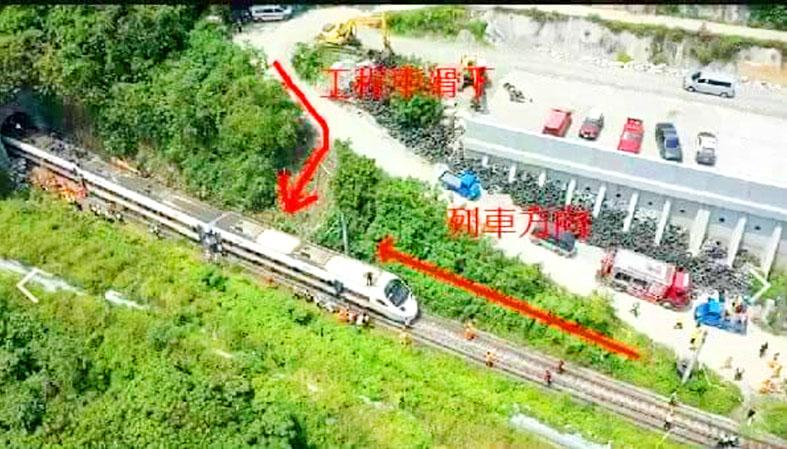
Photo courtesy of a reader
The southbound train of eight cars was about to enter the tunnel when the crane truck slid down a nearby slope, colliding with the train’s No. 8 car just outside the tunnel ingress.
The impact partially derailed the train, which continued into the tunnel before colliding with the tunnel’s interior walls.
The six leading cars piled up in the crash and most fatalities occurred in the No. 7 and No. 8 cars, which were crushed from the impact, the agency said.
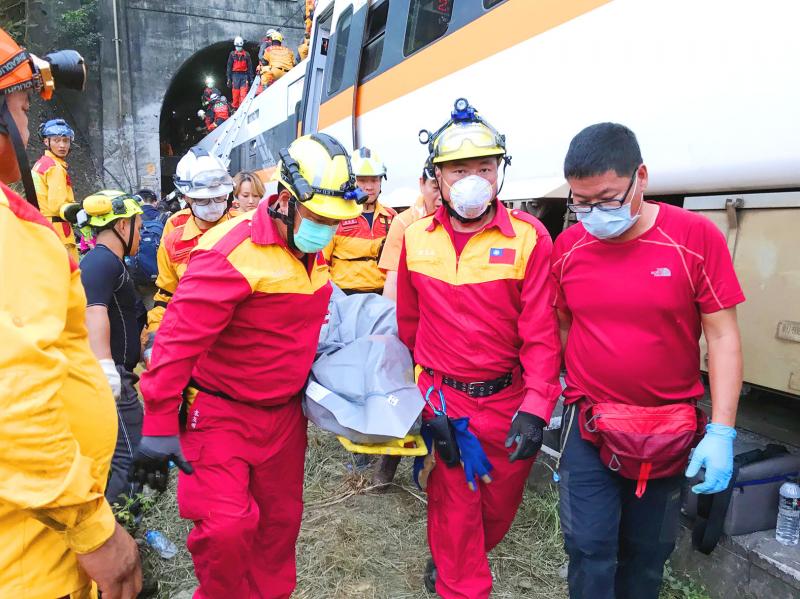
Photo copied by Lin Chia-tung, Taipei Times
Hualien County Police Bureau Commissioner Tsai Ting-hsien (蔡丁賢) confirmed that as of 4pm, police were questioning the truck’s driver, surnamed Lee (李), who was not in the vehicle at the time of the crash.
Investigators suspect that Lee did not engage the hand brake before parking the vehicle at a worksite servicing a separate TRA rail line on a hill adjacent to the tunnel, he said.
The TRA said Lee should not have been on the site, as all work on that line had been suspended to avoid crews from interfering with train operations over the four-day Tomb Sweeping Day holiday, which began yesterday.
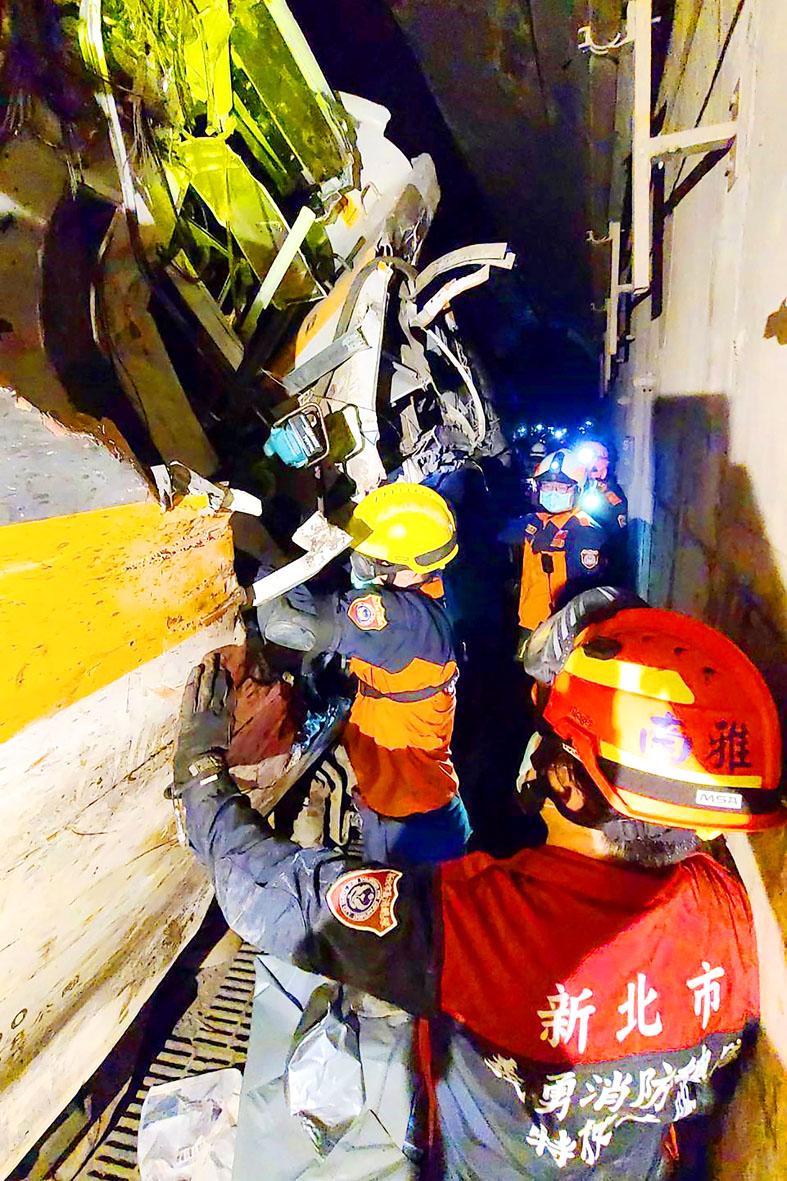
Photo: New Taipei City Fire Department / AFP
The subcontractor in charge of the work had been informed not to be on site, but Lee, the site supervisor, had apparently decided to inspect the site, the agency said.
Lee’s reason for conducting the inspection on an off-day and for driving about the site in a construction vehicle remains unclear, it added.
Premier Su Tseng-chang (蘇貞昌), Minister of Transportation and Communications Lin Chia-lung (林佳龍) and Minister of the Interior Hsu Kuo-yung (徐國勇) were at the site of incident.
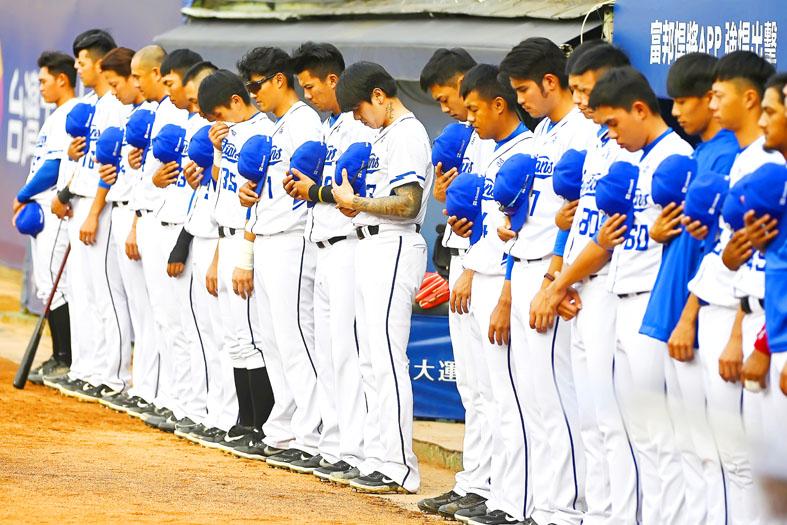
Photo: Chen Chih-chu, Taipei Times
Su expressed sadness and regret for those killed and their families, while Lin apologized in a statement.
Presidential Office spokesman Xavier Chang (張惇涵) said that President Tsai Ing-wen (蔡英文) had instructed all relevant government agencies to coordinate on relief work and demanded a thorough investigation into the incident.
More than 40 countries, including all 15 of Taiwan’s diplomatic allies, expresssed sympathy following the tragedy.
Additional reporting by Hua Meng-ching, Yang Yuan-ting, Yu Tai-lang and agencies
This story has been updated since it was first published.

A magnitude 5.6 earthquake struck off the coast of Yilan County at 12:37pm today, with clear shaking felt across much of northern Taiwan. There were no immediate reports of damage. The epicenter of the quake was 16.9km east-southeast of Yilan County Hall offshore at a depth of 66.8km, Central Weather Administration (CWA) data showed. The maximum intensity registered at a 4 in Yilan County’s Nanao Township (南澳) on Taiwan’s seven-tier scale. Other parts of Yilan, as well as certain areas of Hualien County, Taipei, New Taipei City, Taoyuan, Hsinchu County, Taichung and Miaoli County, recorded intensities of 3. Residents of Yilan County and Taipei received

Taiwan has secured another breakthrough in fruit exports, with jujubes, dragon fruit and lychees approved for shipment to the EU, the Ministry of Agriculture said yesterday. The Animal and Plant Health Inspection Agency on Thursday received formal notification of the approval from the EU, the ministry said, adding that the decision was expected to expand Taiwanese fruit producers’ access to high-end European markets. Taiwan exported 126 tonnes of lychees last year, valued at US$1.48 million, with Japan accounting for 102 tonnes. Other export destinations included New Zealand, Hong Kong, the US and Australia, ministry data showed. Jujube exports totaled 103 tonnes, valued at

BIG SPENDERS: Foreign investors bought the most Taiwan equities since 2005, signaling confidence that an AI boom would continue to benefit chipmakers Taiwan Semiconductor Manufacturing Co’s (TSMC, 台積電) market capitalization swelled to US$2 trillion for the first time following a 4.25 percent rally in its American depositary receipts (ADR) overnight, putting the world’s biggest contract chipmaker sixth on the list of the world’s biggest companies by market capitalization, just behind Amazon.com Inc. The site CompaniesMarketcap.com ranked TSMC ahead of Saudi Aramco and Meta Platforms Inc. The Taiwanese company’s ADRs on Tuesday surged to US$385.75 on the New York Stock Exchange, as strong demand for artificial intelligence (AI) applications led to chip supply constraints and boost revenue growth to record-breaking levels. Each TSMC ADR represents

TRUST: The KMT said it respected the US’ timing and considerations, and hoped it would continue to honor its commitments to helping Taiwan bolster its defenses and deterrence US President Donald Trump is delaying a multibillion-dollar arms sale to Taiwan to ensure his visit to Beijing is successful, a New York Times report said. The weapons sales package has stalled in the US Department of State, the report said, citing US officials it did not identify. The White House has told agencies not to push forward ahead of Trump’s meeting with Chinese President Xi Jinping (習近平), it said. The two last month held a phone call to discuss trade and geopolitical flashpoints ahead of the summit. Xi raised the Taiwan issue and urged the US to handle arms sales to